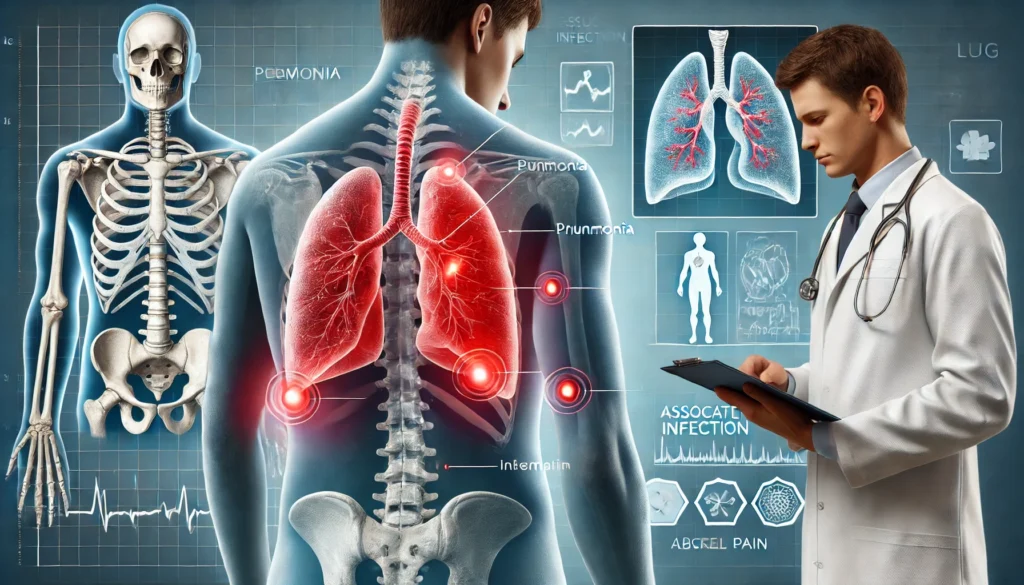Pneumonia is a serious respiratory infection that affects the lungs and can lead to a variety of symptoms, including cough, fever, and shortness of breath. However, many people may wonder: Can pneumonia cause back pain? The short answer is yes. While back pain is not typically listed as one of the most common symptoms of pneumonia, it can occur for various reasons. In this article, we’ll explore how pneumonia can lead to back pain, its possible causes, and what you should do if you experience this symptom.
How Pneumonia Causes Back Pain
Pneumonia primarily affects the lungs, but the pain associated with it can extend beyond the chest area. Back pain from pneumonia may arise due to several factors:
Read Also: How Long Does a Toradol Shot Last For Back Pain – Does a Toradol Injection Alleviate Backache!
Coughing
One of the most common symptoms of pneumonia is a persistent cough. The intense coughing associated with this infection can strain the muscles in your back, leading to soreness and discomfort. Repeated coughing increases pressure on your abdominal and back muscles, which can result in back pain, particularly in the lower back.
Inflammation and Infection
Pneumonia causes inflammation in the lungs and surrounding tissues. When the infection spreads or is severe, it can irritate the muscles, nerves, and even the pleura (the membrane surrounding the lungs), potentially leading to pain in the back and chest areas. The pain may feel sharp or aching, depending on the extent of inflammation.
Postural Changes
When you’re suffering from pneumonia, it can be difficult to maintain normal posture due to fatigue, shortness of breath, and overall weakness. Poor posture or lying down for extended periods of time can strain your back muscles, contributing to pain.
Referred Pain
Sometimes, the pain caused by pneumonia may not always originate from the lungs themselves. The irritation in the chest or abdomen can cause referred pain, meaning the sensation of pain is felt in a different area of the body—like the back. This type of pain may be confused with musculoskeletal back issues, but it’s related to the infection itself.
When Should You Be Concerned About Back Pain with Pneumonia?

While some degree of back pain may be expected with pneumonia due to the reasons mentioned above, there are situations when you should seek medical attention. If you experience any of the following symptoms along with back pain, it’s crucial to consult a doctor:
- Severe pain: If your back pain is persistent and significantly bothersome, it could indicate a complication or a more serious infection.
- Difficulty breathing: Back pain coupled with shortness of breath or difficulty breathing is a serious concern and requires immediate medical attention.
- Chest pain: If the back pain is accompanied by sharp chest pain, it could be a sign of a more serious issue, such as a lung complication or even a heart condition.
- Fever and chills: High fever, chills, or worsening symptoms despite treatment are signs that the infection may not be under control.
How to Manage Back Pain Caused by Pneumonia
If you’re experiencing back pain along with pneumonia, the treatment will typically focus on managing the infection and providing relief for the associated pain. Here are some general strategies:
Treat the Infection
The first priority is treating the underlying pneumonia. Antibiotics are often prescribed if the pneumonia is bacterial, while antiviral medications may be used for viral infections. Following your doctor’s advice for managing pneumonia will help reduce the overall symptoms, including back pain.
Over-the-Counter Pain Relievers
For mild back pain, over-the-counter pain relievers like ibuprofen or acetaminophen can be helpful in alleviating discomfort. Be sure to follow the recommended dosage instructions and consult your doctor if you have concerns.
Rest and Hydration
Getting plenty of rest and staying hydrated are essential for your recovery. Resting will allow your body to focus on fighting the infection, while staying hydrated can help loosen mucus in the lungs and reduce overall discomfort.
Gentle Stretching and Posture Correction
If back pain is causing discomfort, gentle stretching and correcting your posture can help. Avoid long periods of bed rest, as this may worsen back pain. Try to sit up straight and take short walks to improve circulation and reduce muscle strain.
Seek Medical Advice
If the back pain becomes severe or doesn’t improve with rest, pain relievers, or treatment for pneumonia, it’s important to see a healthcare provider for further evaluation. In some cases, additional tests may be necessary to rule out complications.
How to Differentiate Between Back Pain from Pneumonia and Musculoskeletal Issues
It can be difficult to tell whether back pain is caused by pneumonia or another musculoskeletal condition, as both can present similarly. Understanding the difference is important for proper treatment. Musculoskeletal back pain usually results from physical strain or injury, whereas pneumonia-related back pain often occurs alongside other symptoms like cough, fever, and shortness of breath. If your back pain is persistent, severe, or accompanied by respiratory symptoms, it may be related to pneumonia and requires a doctor’s evaluation.
The Role of Early Diagnosis in Preventing Pneumonia-Related Complications
Early diagnosis and treatment of pneumonia are crucial in preventing serious complications, including back pain and respiratory failure. If pneumonia is not addressed in its early stages, it can lead to complications like pleurisy (inflammation of the lining around the lungs), which can exacerbate back pain. Prompt treatment with antibiotics or antivirals and close monitoring by a healthcare provider can help reduce the severity of symptoms and prevent the spread of the infection. Regular check-ups during recovery can ensure that any associated symptoms, including back pain, are managed effectively.
FAQs:
1. Can pneumonia cause back pain?
Yes, pneumonia can lead to back pain, particularly from coughing or inflammation in the lungs and chest area.
2. What other symptoms accompany pneumonia?
Common symptoms of pneumonia include cough, fever, shortness of breath, chest pain, and fatigue.
3. Is back pain always a sign of pneumonia?
No, back pain can have many causes, and not everyone with pneumonia experiences back pain. It is one of the possible symptoms.
4. How can pneumonia-related back pain be treated?
Pneumonia-related back pain is typically managed with pain relievers, rest, and antibiotics or antiviral medications, depending on the cause of the pneumonia.
5. When should I see a doctor for pneumonia-related symptoms?
You should seek medical care if you have difficulty breathing, severe chest pain, or if pneumonia symptoms worsen, including persistent back pain.
Conclusion:
Pneumonia can indeed cause back pain, especially through mechanisms like coughing, inflammation, and postural changes. While back pain isn’t the most common symptom of pneumonia, it can occur and may be bothersome. If you’re dealing with pneumonia and back pain, it’s essential to focus on treating the underlying infection, managing the pain, and seeking medical advice if symptoms worsen or don’t improve.If you’re experiencing pneumonia symptoms, including back pain, don’t hesitate to contact a healthcare provider to ensure proper diagnosis and treatment.











